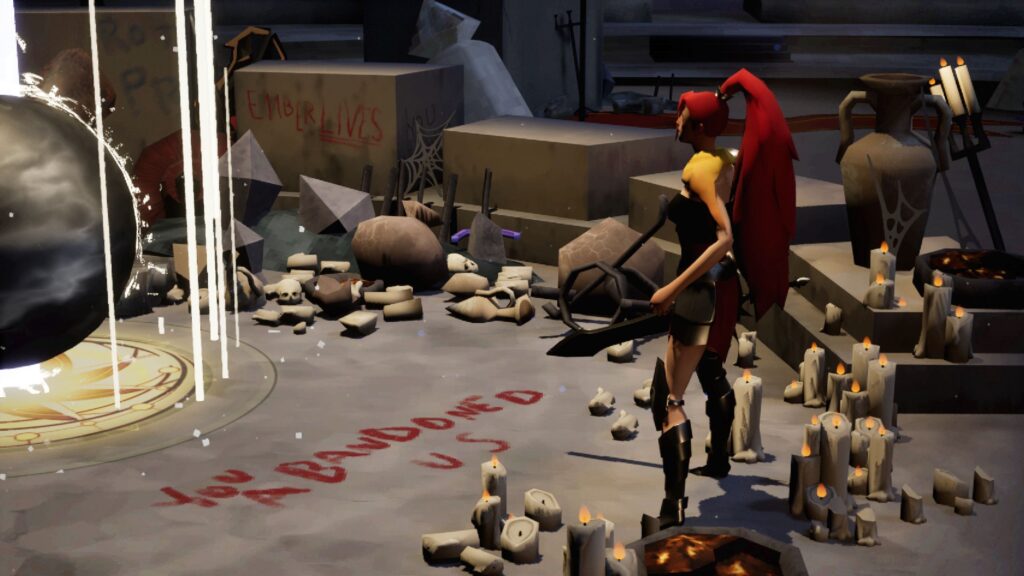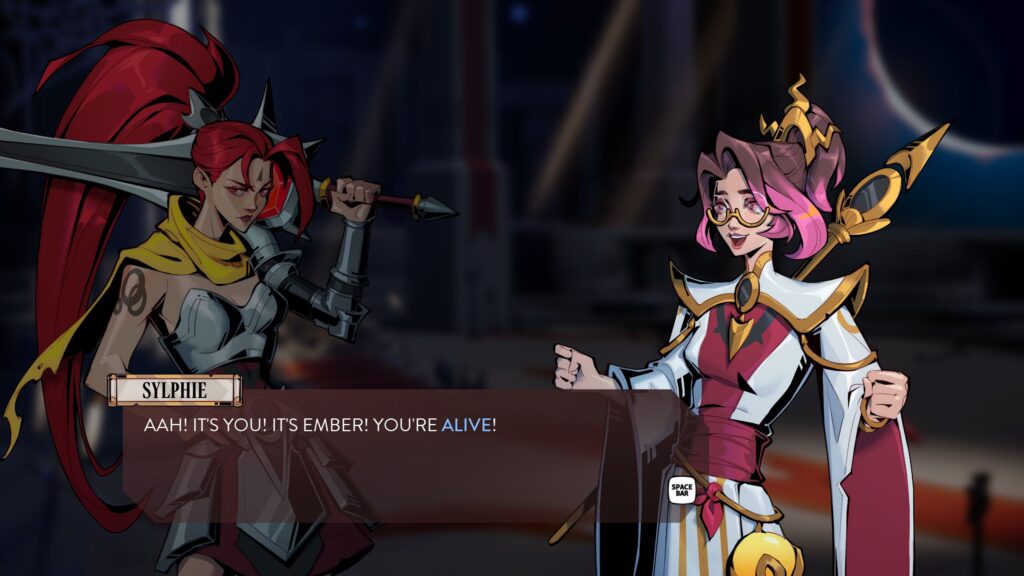Eclipse Breaker
(PC, 2025)
Project Info
Release Date: 11/7/25 (PC)
My Role: Narrative Designer, Writer
Developed by Jorge Rodriguez and Lunar Workshop. Published by Lunar Workshop.
Scope of Work
- Wrote story, characters, lore, and all in-game text for roguelike action-RPG
- Designed all narrative systems: banter, quest, and story progression
- Over 20,000 words of character dialogue
- Character art documentation and guidance
- Voice actor briefs and casting
- Marketing copy and strategy
Narrative Design Highlights
When I began work on Eclipse Breaker, it was a combat-focused roguelike with no narrative to speak of. But since it was themed as a retro RPG (and comparable to Hades), players expected a deep story. My challenge was to devise a narrative with enough excitement and emotional heft to thrill RPG fans, but unobtrusive and low-resource enough leave focus on the combat gameplay. Here are two key ways in which I tailored Eclipse Breaker‘s narrative to solve specific design problems faced by the game as a whole.

Finding a Hook
Problem: Like many indie games, Eclipse Breaker was waging a battle against discoverability. The lead designer and a marketing consultant identified their key issue as the lack of a “hook” – the gameplay was deep and novel and the aesthetics had appeal, but it was proving difficult to summarize how they fit together. The two were contradictory: the game looked like a late-90s JRPG, but it played like a modern action roguelike, so it didn’t meet either audience’s expectations.
Process: When thinking of what narrative would be right for the project, I knew it would have to address this issue: not by stealing attention from the game’s core with a loud gimmick, but by tying together its systems and aesthetics into a single easy-to-understand concept. I made that problem of “Why would an old RPG have modern gameplay?” into my writing prompt, sharing a list of pitches with Jorge (Rodriguez, lead designer) that ranged from haunted-game metahorror to rapid-fire parody.
Solution: In the end, we chose a premise where an old JRPG sits unplayed for 25 years, but its world keeps going while its protagonist sits frozen. The game starts with the player loading up a fake save file from the year 2000, and seeing a montage of “updates” where developers changed the gameplay while the player-less world fell to darkness. The story follows the unfrozen hero Ember as she struggles to finish her quest and find her place in an unfamiliar world.
This narrative hook made the game’s marketing conflict (nostalgic RPG vibes but modern gameplay) into the protagonist’s conflict. By explaining the premise, we could explain the gameplay and aesthetic that were otherwise so tough to summarize: “a lost classic RPG hero is frozen in time for 25 years, and finds that her world has become a modern roguelike.”

Spirit Companions
Problem: Since Eclipse Breaker was themed as a PSX-era JRPG, playtesters expected gameplay to involve a party of playable characters, with an ensemble narrative to match. However, due to scope cuts, the dev team only had resources to make a single playable character, not a full party. Was the game doomed to disappoint JRPG-loving players as it did in early playtests, or was there a way to capture the genre’s joy with only one character?
Process: I kept this problem in mind while brainstorming plot beats: could we introduce a likeable ensemble and have the feel of a party without setting expectations that they would be playable?
One core aspect of the narrative is that the world changed in disastrous ways while Ember was frozen, leaving her lost in an unfamiliar world. When trying to think of what specifically went wrong during those 25 years, I remembered the party problem. What if Ember did have a party, but they’ve all since died? Then her companions would be critical characters in the narrative, but not playable. It would instantly explain why Ember feels adrift, while underscoring the difference between her familiar JRPG quest and her new lonely roguelike world.
Solution: Ghosts! Ember summons the spirits of her former companions to talk, help her in combat, and ultimately work through their issues and regrets. That way the player gets lots of party-based banter and dramatic moments, but with no expectation that the party is playable. These spirits also provided thematic underpinnings for many of the game’s progression systems, becoming the core of how players unlock and customize new abilities.